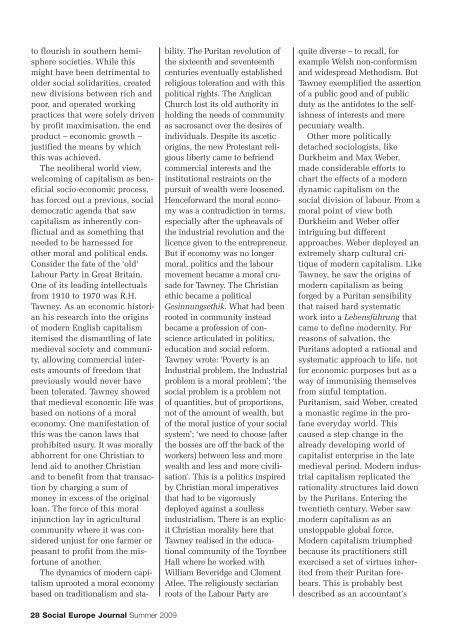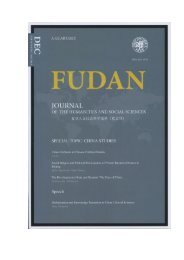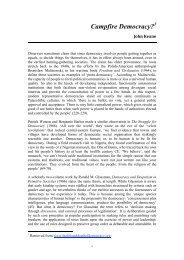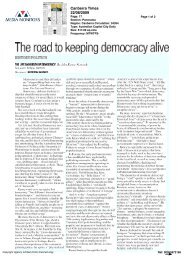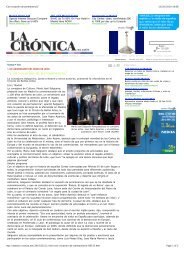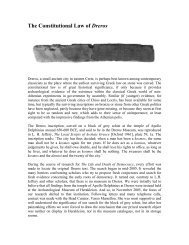The Ethics of Capitalism - Social Europe Journal
The Ethics of Capitalism - Social Europe Journal
The Ethics of Capitalism - Social Europe Journal
Create successful ePaper yourself
Turn your PDF publications into a flip-book with our unique Google optimized e-Paper software.
to flourish in southern hemisphere<br />
societies. While this<br />
might have been detrimental to<br />
older social solidarities, created<br />
new divisions between rich and<br />
poor, and operated working<br />
practices that were solely driven<br />
by pr<strong>of</strong>it maximisation, the end<br />
product – economic growth –<br />
justified the means by which<br />
this was achieved.<br />
<strong>The</strong> neoliberal world view,<br />
welcoming <strong>of</strong> capitalism as beneficial<br />
socio-economic process,<br />
has forced out a previous, social<br />
democratic agenda that saw<br />
capitalism as inherently conflictual<br />
and as something that<br />
needed to be harnessed for<br />
other moral and political ends.<br />
Consider the fate <strong>of</strong> the ‘old’<br />
Labour Party in Great Britain.<br />
One <strong>of</strong> its leading intellectuals<br />
from 1910 to 1970 was R.H.<br />
Tawney. As an economic historian<br />
his research into the origins<br />
<strong>of</strong> modern English capitalism<br />
itemised the dismantling <strong>of</strong> late<br />
medieval society and community,<br />
allowing commercial interests<br />
amounts <strong>of</strong> freedom that<br />
previously would never have<br />
been tolerated. Tawney showed<br />
that medieval economic life was<br />
based on notions <strong>of</strong> a moral<br />
economy. One manifestation <strong>of</strong><br />
this was the canon laws that<br />
prohibited usury. It was morally<br />
abhorrent for one Christian to<br />
lend aid to another Christian<br />
and to benefit from that transaction<br />
by charging a sum <strong>of</strong><br />
money in excess <strong>of</strong> the original<br />
loan. <strong>The</strong> force <strong>of</strong> this moral<br />
injunction lay in agricultural<br />
community where it was considered<br />
unjust for one farmer or<br />
peasant to pr<strong>of</strong>it from the misfortune<br />
<strong>of</strong> another.<br />
<strong>The</strong> dynamics <strong>of</strong> modern capitalism<br />
uprooted a moral economy<br />
based on traditionalism and sta-<br />
bility. <strong>The</strong> Puritan revolution <strong>of</strong><br />
the sixteenth and seventeenth<br />
centuries eventually established<br />
religious toleration and with this<br />
political rights. <strong>The</strong> Anglican<br />
Church lost its old authority in<br />
holding the needs <strong>of</strong> community<br />
as sacrosanct over the desires <strong>of</strong><br />
individuals. Despite its ascetic<br />
origins, the new Protestant religious<br />
liberty came to befriend<br />
commercial interests and the<br />
institutional restraints on the<br />
pursuit <strong>of</strong> wealth were loosened.<br />
Henceforward the moral economy<br />
was a contradiction in terms,<br />
especially after the upheavals <strong>of</strong><br />
the industrial revolution and the<br />
licence given to the entrepreneur.<br />
But if economy was no longer<br />
moral, politics and the labour<br />
movement became a moral crusade<br />
for Tawney. <strong>The</strong> Christian<br />
ethic became a political<br />
Gesinnungsethik. What had been<br />
rooted in community instead<br />
became a pr<strong>of</strong>ession <strong>of</strong> conscience<br />
articulated in politics,<br />
education and social reform.<br />
Tawney wrote: ‘Poverty is an<br />
Industrial problem, the Industrial<br />
problem is a moral problem’; ‘the<br />
social problem is a problem not<br />
<strong>of</strong> quantities, but <strong>of</strong> proportions,<br />
not <strong>of</strong> the amount <strong>of</strong> wealth, but<br />
<strong>of</strong> the moral justice <strong>of</strong> your social<br />
system’; ‘we need to choose (after<br />
the bosses are <strong>of</strong>f the back <strong>of</strong> the<br />
workers) between less and more<br />
wealth and less and more civilisation’.<br />
This is a politics inspired<br />
by Christian moral imperatives<br />
that had to be vigorously<br />
deployed against a soulless<br />
industrialism. <strong>The</strong>re is an explicit<br />
Christian morality here that<br />
Tawney realised in the educational<br />
community <strong>of</strong> the Toynbee<br />
Hall where he worked with<br />
William Beveridge and Clement<br />
Atlee. <strong>The</strong> religiously sectarian<br />
roots <strong>of</strong> the Labour Party are<br />
quite diverse – to recall, for<br />
example Welsh non-conformism<br />
and widespread Methodism. But<br />
Tawney exemplified the assertion<br />
<strong>of</strong> a public good and <strong>of</strong> public<br />
duty as the antidotes to the selfishness<br />
<strong>of</strong> interests and mere<br />
pecuniary wealth.<br />
Other more politically<br />
detached sociologists, like<br />
Durkheim and Max Weber,<br />
made considerable efforts to<br />
chart the effects <strong>of</strong> a modern<br />
dynamic capitalism on the<br />
social division <strong>of</strong> labour. From a<br />
moral point <strong>of</strong> view both<br />
Durkheim and Weber <strong>of</strong>fer<br />
intriguing but different<br />
approaches. Weber deployed an<br />
extremely sharp cultural critique<br />
<strong>of</strong> modern capitalism. Like<br />
Tawney, he saw the origins <strong>of</strong><br />
modern capitalism as being<br />
forged by a Puritan sensibility<br />
that raised hard systematic<br />
work into a Lebensführung that<br />
came to define modernity. For<br />
reasons <strong>of</strong> salvation, the<br />
Puritans adopted a rational and<br />
systematic approach to life, not<br />
for economic purposes but as a<br />
way <strong>of</strong> immunising themselves<br />
from sinful temptation.<br />
Puritanism, said Weber, created<br />
a monastic regime in the pr<strong>of</strong>ane<br />
everyday world. This<br />
caused a step change in the<br />
already developing world <strong>of</strong><br />
capitalist enterprise in the late<br />
medieval period. Modern industrial<br />
capitalism replicated the<br />
rationality structures laid down<br />
by the Puritans. Entering the<br />
twentieth century, Weber saw<br />
modern capitalism as an<br />
unstoppable global force.<br />
Modern capitalism triumphed<br />
because its practitioners still<br />
exercised a set <strong>of</strong> virtues inherited<br />
from their Puritan forebears.<br />
This is probably best<br />
described as an accountant’s<br />
28 <strong>Social</strong> <strong>Europe</strong> <strong>Journal</strong> Summer 2009


